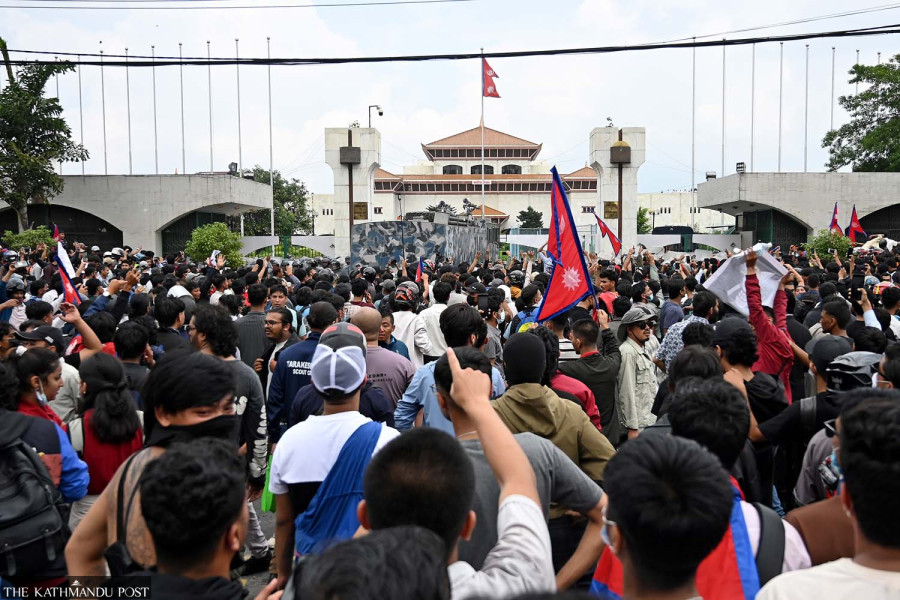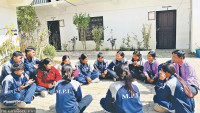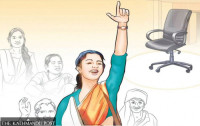National
‘Ignore Gen Z at your peril’
Prominent voices warn government and parties not to dismiss the demands of youths.
Post Report
Prominent voices—writers, doctors, artists, former bureaucrats, among others, who have been closely monitoring Monday’s Gen-Z protest and ensuing carnage—have warned the government and political parties not to underestimate grievances of youths.
Monday’s developments is an outburst of accumulated frustrations of youths caused by corruption, bad governance, abuse of power, and the arrogance of the successive governments and political parties, they say.
“The leaders think that they can do anything when they have a majority in Parliament,” said Dr Arun Sayami, former dean of the Institute of Medicine. “Today’s youths are not their slaves. Stop acting like King Gyanendra [who was ousted from power in 2008] and remove restrictions on social media immediately.”
At least 17 protesters were killed and scores of others were injured when police opened fire on the demonstrators who breached barricades and broke into restricted security zones around the parliament building.
“Today’s incident reminded me of the last days of King Gyanendra’s rule, when he resorted to indiscriminate use of force,” said Dr Aruna Upreti, a public health expert. “This government has followed in the footsteps of Gyanendra Shah by resorting to excessive force against youths.”
Upreti said that Monday’s incident went beyond the suppression of popular uprisings under the Panchayat regime in the 1980s.
“The incumbent government, the ruling Nepali Congress, and the CPN-UML showed arrogance and used excessive force against the young people, who are the future of the country,” said Upreti. “Suppression won’t lessen public frustration over the wrongdoing, poor governance, and rampant corruption.”
Writer Khagendra Sangraula said Monday’s incidents exposed the true face of the incumbent government and ruling parties. He also accused opposition parties—the CPN (Maoist Centre), the Rastriya Swatantra Party (RSP)—of provoking the youths.
“Not only Pushpa Kamal Dahal [former prime minister], the RSP, and Kathmandu Mayor Balendra Shah encouraged frustrated youths, but also royalists including Durga Prasain, the Rastriya Prajatantra Party and others, seized the opportunity to fan the flames,” said Sangraula. “Pushpa Kamal Dahal, who himself banned TikTok during his tenure, ironically denounced the incumbent government's move to ban other social media sites.”
Most people, the Post spoke to, said that they did not expect the Gen-Z protest to spiral out of control and so many people would be killed. They said that today’s youths are not slaves of political parties who obey blindly.
The government has also misinterpreted the Supreme Court’s recent ruling to regulate social media, according to them.
“The Apex court only asked to regulate social media and make it responsible,” said Sangraula. “But this government found a pretext to suppress dissent. The more they suppress, dissenting voices will be even louder, and waves of protests will not stop.”
The government on Thursday banned 26 social media platforms, including Facebook, which ignored the government’s order to register within the Ministry of Communication and Information Technology within a given deadline.
“Today’s youth are smarter, educated and up-to-date than the youth of our time. They are the future of our country,” said Bijaya Lama, an instructor pilot. “I would like to request them not to spoil the environment of peace, and the government also should not use force against our youths.”
Former Secretary Kishor Thapa warned that suppressing protesters cannot silence the dissent against corruption and misuse of power.
“It has become tougher to survive in the country if one is not a cadre of a political party,” said Thapa. “Frustration against the government is not limited only to youths. It is boiling among elderly populations and professionals. It would be better for the government and parties to fulfil the just demands of the public.”




 18.95°C Kathmandu
18.95°C Kathmandu













